Posts: 4,572
Threads: 31
Joined: Nov 2016
I'd pencil in a filler S of the corn for later on to claim otherwise unworkable tiles, and help grow cottages.
(July 15th, 2023, 07:29)greenline Wrote: (July 15th, 2023, 01:03)Tarkeel Wrote: Will be interesting to see if Monarchy is worth the abuse. As for revolting outside a GA, it can be worth it, but you really want to be in a position to take advantage of the bonus; either because your economy is so bad there's barely any GNP loss (and the hammers aren't immediately useful), or the bonus is very strong. I don't have a strong feeling about how our situation is here.
Our economy is still decently strong at the moment, but it will take somewhat of a beating once the next few cities are settled. I do want to be able to take advantage of HR sooner rather than later - our cities are really hurting for luxuries, and there's no precious metals or fur in sight. Just a couple of calendar resources. Plus, OR will let the missionary spam begin to save monument hammers. Maybe once all the settlers are complete?
In short, we want to be able to recoup the lost turn ASAP, or more realistically, two turns if we also swap into judaism. We're currently making almost 20 gpt (and breakeaven around 50%), which looks very healthy at this stage of the game. After settling the next cities will probably look very different. When we ate the revolt in PB66 we had like +3 gpt, and nothing worth building.
Posts: 2,062
Threads: 20
Joined: Dec 2014
Should the other settlers move to the equinox 1 and 2 spots? The filler corn city seems like the last easy available site that has a strong food resource available. Instinct says to grab those first. But is it better now to start investing in the slow growers, so they can get somewhere in the medium term?
(July 15th, 2023, 01:03)Tarkeel Wrote: In short, we want to be able to recoup the lost turn ASAP, or more realistically, two turns if we also swap into judaism. We're currently making almost 20 gpt (and breakeaven around 50%), which looks very healthy at this stage of the game. After settling the next cities will probably look very different. When we ate the revolt in PB66 we had like +3 gpt, and nothing worth building.
If we're looking at a revolt once the economy is crashed, it would probably be just to HR + OR, not Judiasm. Unless we get lucky a lot of random spreads, we'll need time to pump out missionaries from Creation.
Without any other changes, we'll get a GP from the oracle in 30 odd turns. Can speed that up a lot if we slip a library or a temple in Dune. Ideally would want bureaucracy as well as a religion swap?
I am planning to move the palace into Atlas Shrugged as soon as the granary is built there. I remember TBS had a game where he delayed a palace move and that cost him in the long term. So better to bite the bullet now, I think.
Now that I'm thinking about national wonders - Republic seems the best place for a GP farm with 3 food resources. Creation could make a strong Moai + HE city.
Posts: 4,572
Threads: 31
Joined: Nov 2016
Moving the palace is one of those things I forget is possible to do, that's how rarely I do it. Does it make much sense before bureaucracy? With a few more cities to the east we might recoup some on distance costs, but it's still a lot of hammers invested.
For national wonders, I agree that Creation looks like a good HE site, but it will probably want the wheat to work enough hills. That puts a damper on NE in Republic. I usally prefer to keep the second spot open for West Point, but in this game that is likely aiming too far down the road. We don't really have that many good Moai sites available; Dune is almost as good a spot (minus the lake).
(I only now realized I forgot to give you input on Diamond Age, and I still owe you a post on Dune that will be coming later.)
July 15th, 2023, 11:36
(This post was last modified: July 15th, 2023, 11:36 by greenline.)
Posts: 2,062
Threads: 20
Joined: Dec 2014
Don't worry on taking any time with book discussion. I spend enough time not writing for my own side projects that I can't complain.
Moving the palace wouldn't provide any real benefits pre bureaucracy - it's more about getting the city ready for when bureaucracy does come in. For Atlas Shrugged, I think it makes sense, because what we want to do with the city is grow it on all the river cottages ASAP, to make up for it being settled only now. It is a city where I don't want to do much of any whipping. Once it finishes a cheap granary, the main infrastructure option it would have besides moving the palace is building a library, which might be worth it. I am not sure how much to prioritize libraries without having the OR bonus.
(If we had FIN, I would be much less pressured to move the capital, but it's going to be rather sorry long term without FIN coast).
Stacking Moai + HE together seemed like a powerful play, because it lets you have another swathe of tiles that would otherwise go to waste, and lets you produce a ton of ships or land units depending on the circumstance. I think naval plays will be more of an option than Krill suggested in the setup thread - we can build a fort chain on that finger of land to have access to Bing's capital and coastline.
I agree that Creation needing the wheat does put a damper on NE. We may just skip building it altogether - there isn't really any city site available with a ton of food to spare for specialists. Equinox 2 would make a good ironworks city long term, but I doubt the game will go on that long.
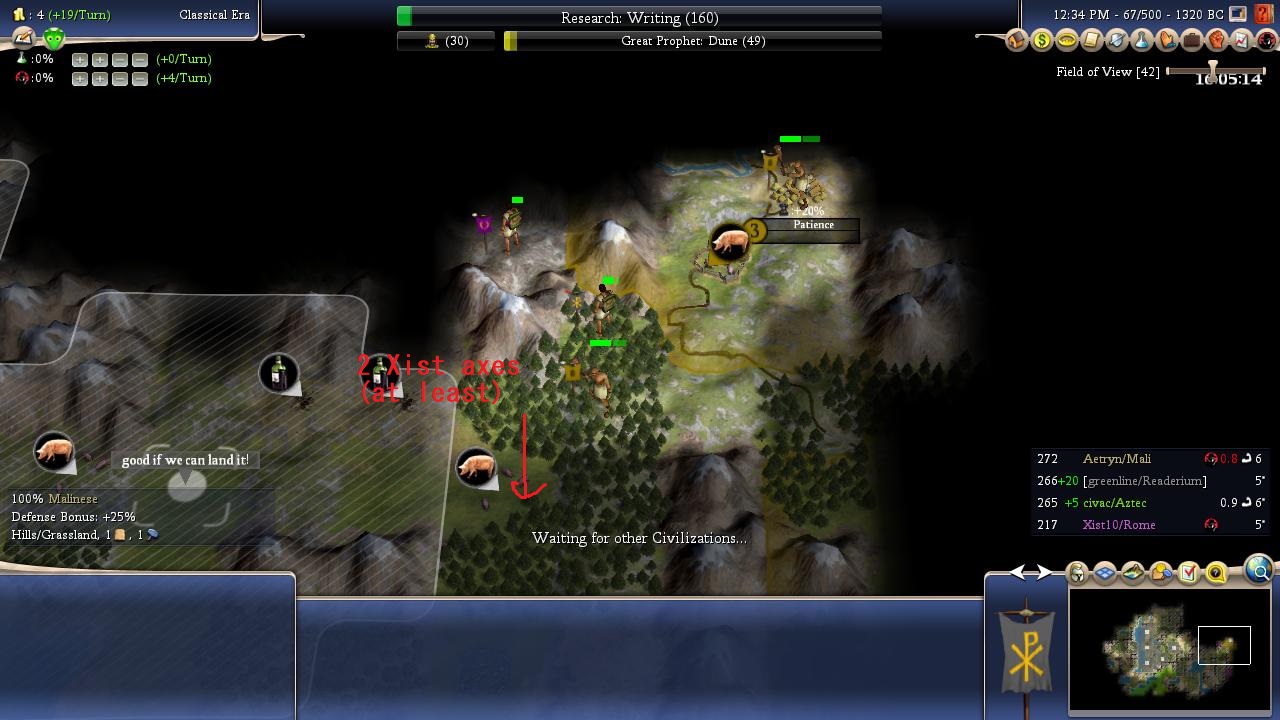
A bit of inter turn gossip while we're waiting. Aetryn has been logged in a while and has yet to play. I think this might be why - this city is under defended and Xist has a probing force to the south.
Posts: 2,062
Threads: 20
Joined: Dec 2014
Aetryn spikes in power, but the reinforcements seem to be slow to arrive on the front:
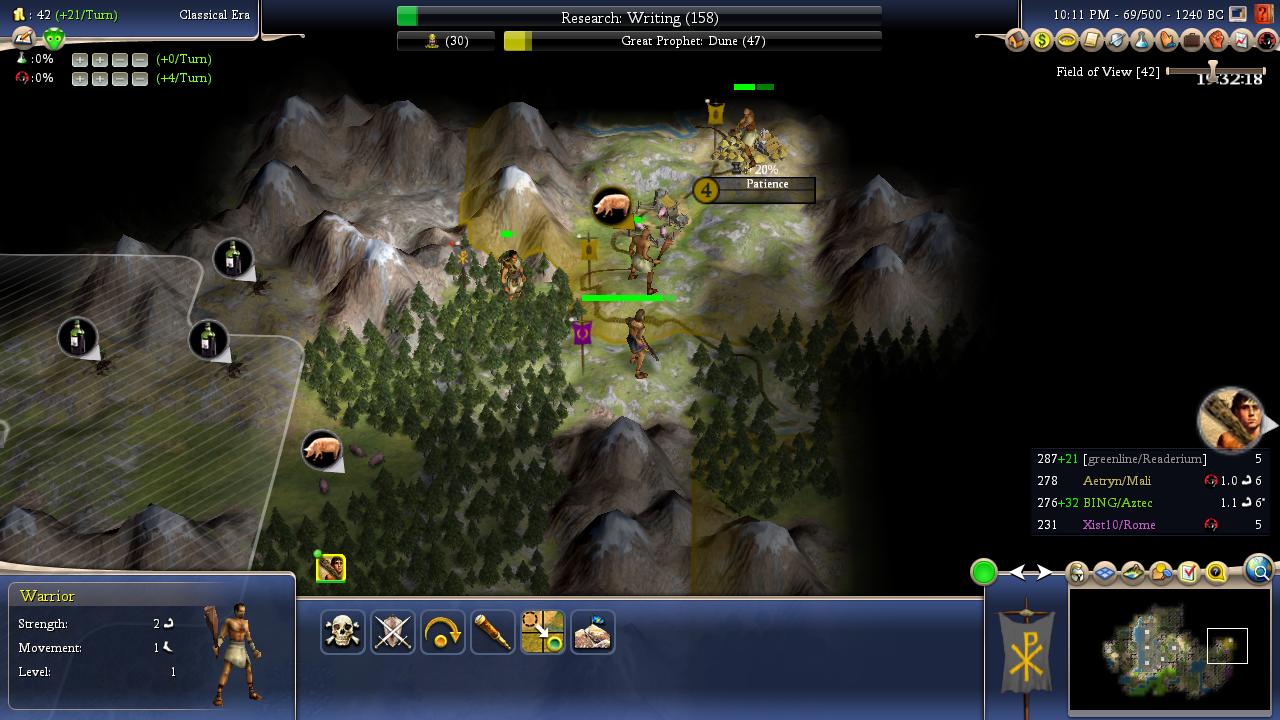
Perhaps this city is food poor, and he does not want to whip it, knowing a skirm or something will arrive in time? I wonder if the reload situation was related to this.
In the south, we run into our own little border skirmish:
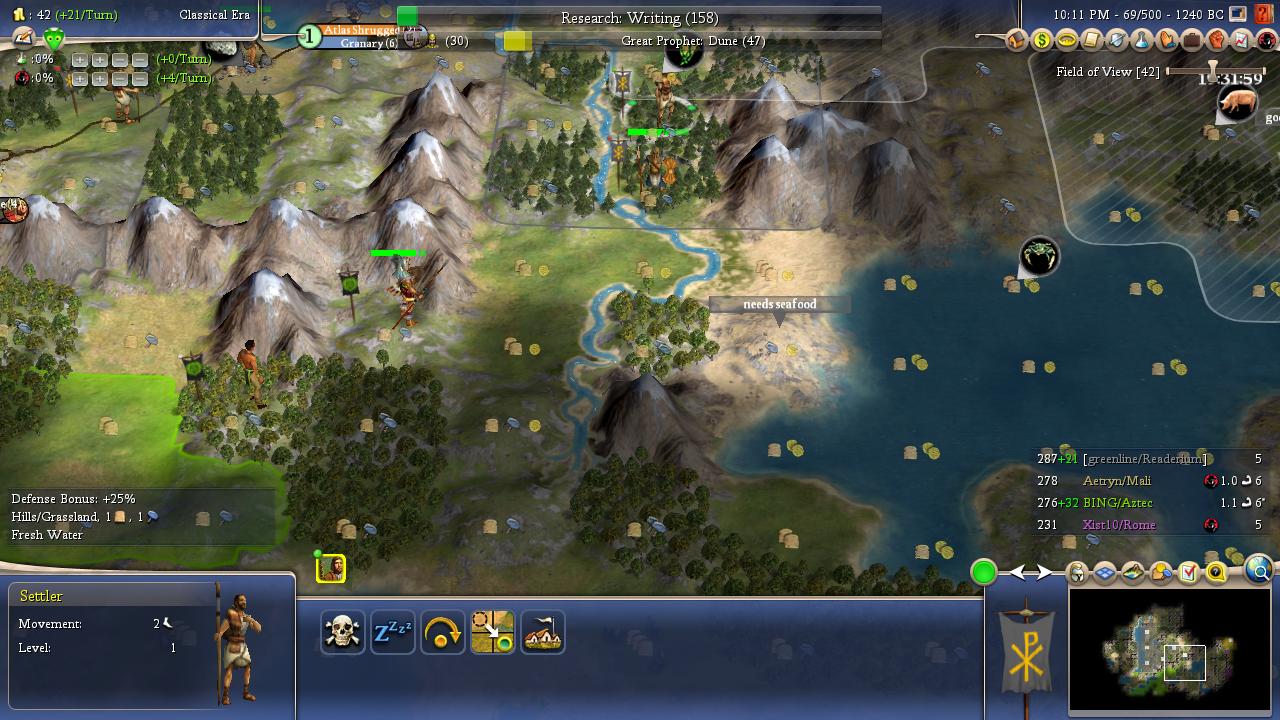
Seeing Bing's forces in the area, I made an executive decision to settle south of the corn. Perhaps from there we can push further on to the spices, depending on how Bing responds. But I think having to send troops on a road chariots could cut off is rather sketchy, instead of forcing an invader through hills any troops in the city can attack out on. We can settle another city by those pigs that gets the crabs, and this city still grabs the floodplain.
Writing due in 2-3 turns. Two more settlers en route to grab the Equinox 1 and 2 sites.
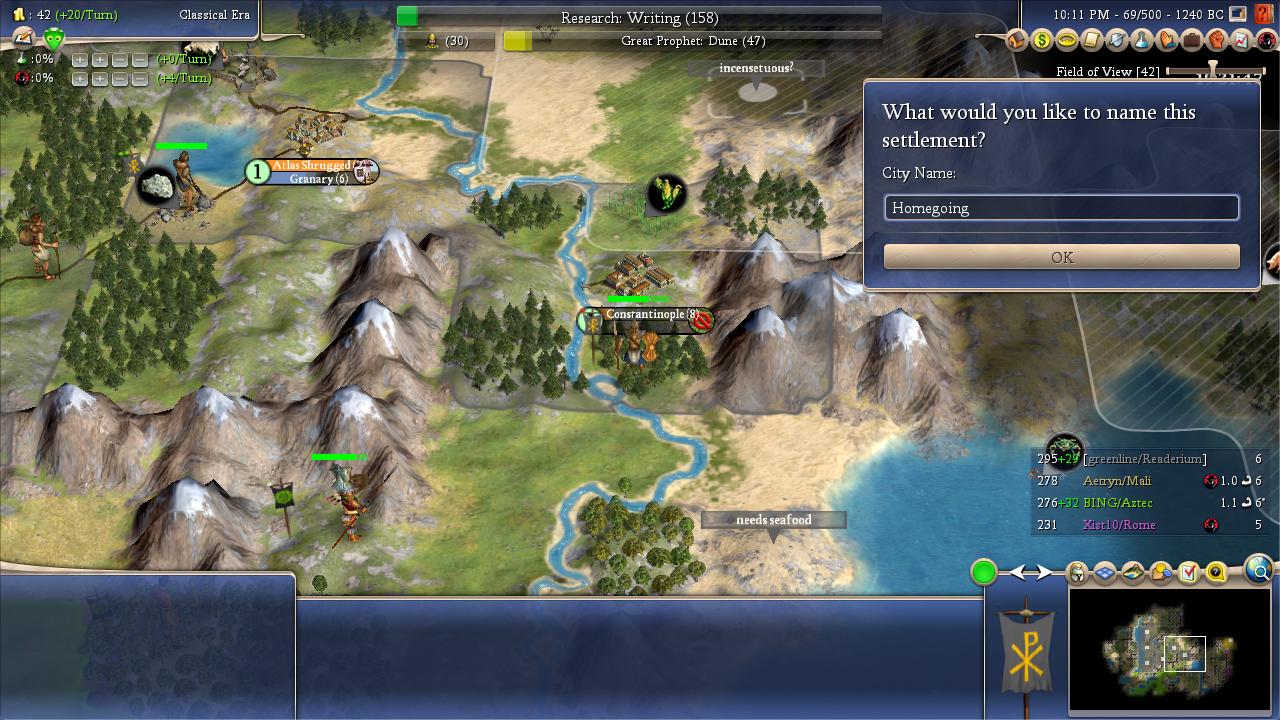 Homegoing
Homegoing is the most recent novel you will see on this list, having come out in 2016. It is a post colonial sort of historical fiction, where it follows the generations of a family in Ghana and the United States, seeing the rise and fall of the Asantes, the trans-Atlantic slave trade, decolonization, and so on. For this alone, it wouldn't be remarkable, as there is a whole genre of these types of books now. For whatever reason, it seems to be in vogue to try and capture the motion of the last few centuries by tracing some family tree in a colonized country. Usually these books meet a certain standard of competence, and they are rarely so disastrous when compared to some of the complete garbage you'll find in your local bookstore these days. But few had me wanting to think about them much after I read them. Homegoing, on the other hand, is something I enjoy revisiting. With some caveats.
What is the fundamental difference between Homegoing and all the other post colonial literature out there? For me, it comes down to the themes and the messaging.
A great deal of post colonial literature, and a great deal of other books written with similar subjects, seem to focus most on the author or the subject having a grievance. The protagonist or their people have been wronged, and the message of the book is that wrongdoing demands repayment. The question the author wants to answer is thus: how can I convince the reader that this injustice is worthy of attention, compared to all the other injustices that are being blared on the news constantly?
Homegoing, by contrast, has a different question in mind. The author agrees with the former that the effects of colonization and modernity are corrosive. But the question, instead, is this: given that the effects of colonization, decolonization, and modernity are everywhere, how does one manage to to live a good and fulfilling life?
This is the problem that faces the characters - at least in Ghana. The narrative is split between a woman who stays in her village in Ghana, and one who is sold into slavery into the US. The part of the book focusing on Ghana is the more compelling one, and the one where the author had more knowledge in writing about it. The narrative of the woman in Ghana, and her line of descendants, is one about struggling to deal with cultural change that is out of their control. The men and the women want there want to live in a way that makes sense - where they can practice a skill they understand, marry and have children, and then pass on that knowledge. This is something that gets more and more difficult when they have to deal with the intrusions of intensified war, shifting to the cultivation of a cash crop rather than one made for local sustenance, the intrusions of a foreign government and a foreign religion with its missionaries, and the general malaise that came with the post colonial system.
I am a fan of most of these stories, and I wish they were given more time and more words to flesh them out.
Unfortunately, the stories set in the US are not up to par. The author, Yaa Gyasi, is an immigrant from Ghana rather than being a native, and the narratives of the slave woman's family unfortunately seems like it was mainly inspired by television. A lot of it feels like it was based on either Roots or a History channel documentary, and it also feels littered with strangely wishful thinking about US race relations, the kind of which you'd typically only find on places like Lipstick Alley.
Despite all that, I'd still recommend the book. As the author is still alive, it is the kind of book that makes me wish I could meet her someday, to ask questions about themes and characters.
July 16th, 2023, 01:10
(This post was last modified: July 16th, 2023, 01:11 by Tarkeel.)
Posts: 4,572
Threads: 31
Joined: Nov 2016
(July 15th, 2023, 22:15)greenline Wrote: Seeing Bing's forces in the area, I made an executive decision to settle south of the corn. Perhaps from there we can push further on to the spices, depending on how Bing responds. But I think having to send troops on a road chariots could cut off is rather sketchy, instead of forcing an invader through hills any troops in the city can attack out on. We can settle another city by those pigs that gets the crabs, and this city still grabs the floodplain.
I approve. It's preferable to have cities that can form an interlinked defense; the seafood city would proably have to be indefensible cumplezone. Not sure if they will even contest the site, as the flood plains is under our control and the crabs can be claimed from the east.
Note that Civac is very conflict-averse and is only likely to attack with justification. The bad news is that stopping Byz before 'Phracts might be justification enough here. Bing on the other hand is more likely to play the turn as it appears and not have any longer reaching plans of neighbor stability.
(July 15th, 2023, 22:15)greenline Wrote: Homegoing is the most recent novel you will see on this list, having come out in 2016. It is a post colonial sort of historical fiction, where it follows the generations of a family in Ghana and the United States, seeing the rise and fall of the Asantes, the trans-Atlantic slave trade, decolonization, and so on. For this alone, it wouldn't be remarkable, as there is a whole genre of these types of books now. For whatever reason, it seems to be in vogue to try and capture the motion of the last few centuries by tracing some family tree in a colonized country. Usually these books meet a certain standard of competence, and they are rarely so disastrous when compared to some of the complete garbage you'll find in your local bookstore these days. But few had me wanting to think about them much after I read them. Homegoing, on the other hand, is something I enjoy revisiting. With some caveats.
[...]
Homegoing, by contrast, has a different question in mind. The author agrees with the former that the effects of colonization and modernity are corrosive. But the question, instead, is this: given that the effects of colonization, decolonization, and modernity are everywhere, how does one manage to to live a good and fulfilling life?
That sounds like a very interesting book.
July 16th, 2023, 16:21
(This post was last modified: July 16th, 2023, 16:21 by greenline.)
Posts: 2,062
Threads: 20
Joined: Dec 2014
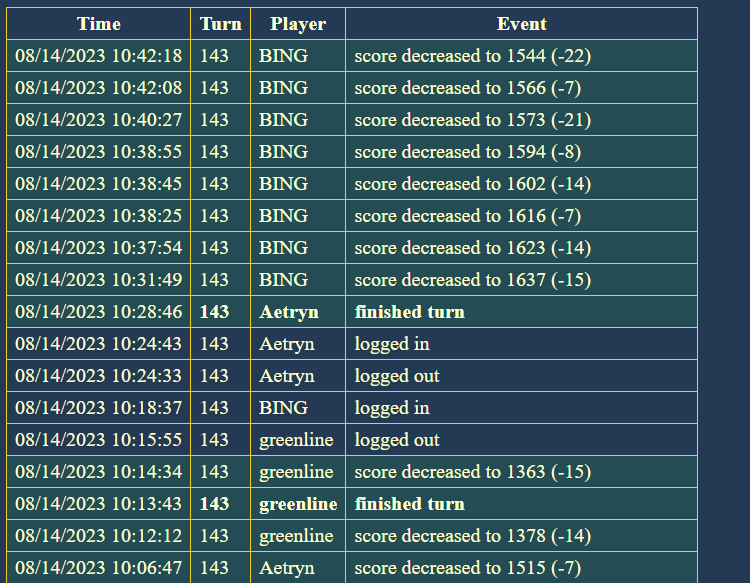
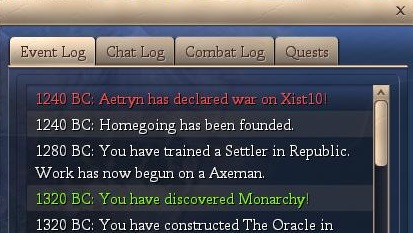
Well - can't say I saw that coming.
Looks like a size 1 border city raid? I don't think Xist is at risk of dying here, but this will set him back quite a bit. I wonder what advice Superdeath has been giving here.
July 16th, 2023, 16:32
(This post was last modified: July 16th, 2023, 16:33 by greenline.)
Posts: 2,062
Threads: 20
Joined: Dec 2014
This alters the long term strategic picture. Xist is clearly the weak fish in the pond now - it may be more prudent to try and absorb his land rather than crashing into Bing. It depends on how crazy Bing's lead gets in the near future. Unfortunately, the path our Phracts would have to take is long and rugged.
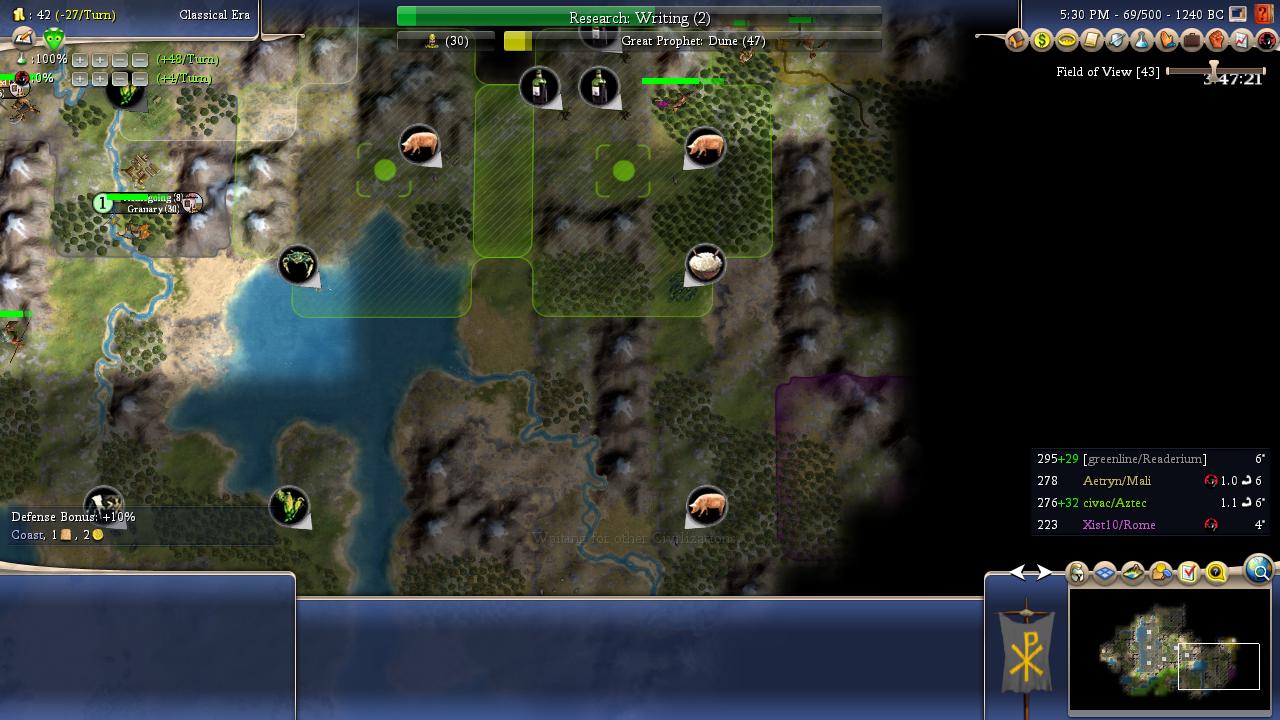
But at least the land here is green and foody. Will have to make it a priority to grab a foothold here before Aetryn can seal it off. I am considering diverting one of the Equinox settlers to grab the crab / pig spot.
Posts: 4,572
Threads: 31
Joined: Nov 2016
(July 16th, 2023, 16:32)greenline Wrote: But at least the land here is green and foody. Will have to make it a priority to grab a foothold here before Aetryn can seal it off. I am considering diverting one of the Equinox settlers to grab the crab / pig spot.
Yeah, that's probably a better city, and ties in nicely with moving the capital. Getting roads down in that direction will be important.
Posts: 2,062
Threads: 20
Joined: Dec 2014
Writing in. Our economy slows with the costs of expansion ,and it is only going to worsen in the short term as we settle two new cities and then work on settlers for two more.
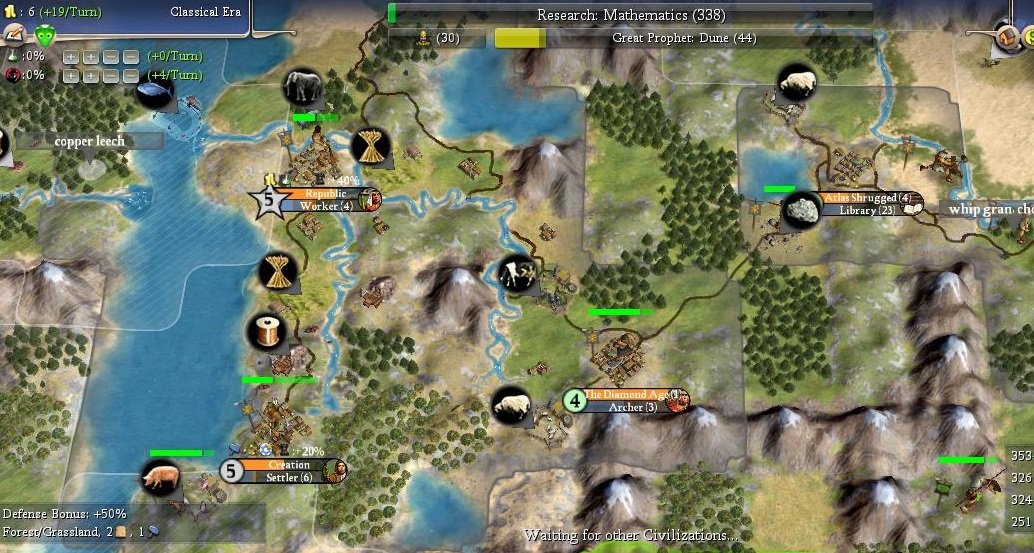
Bing offered open borders - I don't think we have a trade connection, and I declined anyway. I don't think it is worthwhile to give him that boost, especially when we are reaping the nice benefits of the boosted domestic routes that no one else has.
6 turns to finish Mathematics at 100%, and more for Currency. Is that typical for this stage of the game?
|



